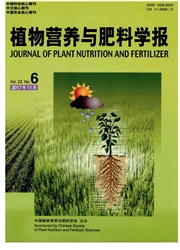

 中文摘要:
中文摘要:
通过砂培试验比较人工接种禾谷镰刀菌(Fusarium graminearum)后,不同钾处理对玉米幼根中糖含量及糖代谢关键酶活性和基因表达的影响。结果表明,不施钾处理中,接菌比未接菌处理玉米幼根中蔗糖和葡萄糖含量显著降低,且蔗糖的下降速率高于葡萄糖的下降速率。随着病原菌入侵时间的延长,不施钾处理葡萄糖与蔗糖比值显著升高,接菌8 d后,缺钾幼根葡萄糖与蔗糖的比值是充足供钾幼根的近10倍。此外,钾素有利于病原菌入侵,幼根中蔗糖合成酶(SS)和蔗糖磷酸合成酶(SPS)活性提高,ss和sps基因表达量增加;而缺钾处理中,ss基因的表达量几乎没有发生变化,sps基因的表达量在接菌后6d才有所增加。说明在病原菌入侵后,钾素可以通过调节受侵染组织糖代谢相关酶的活性,协调受侵染部位糖代谢过程,增强抗病能力。
 英文摘要:
英文摘要:
The effects of potassium on sucrose and glucose content,sugar metabolism related enzyme activity and the expression of related genes in maize root infected with Fusarium graminearum were studied under sand-culture experiment.The results showed that under K stress,pathogen infection led to significant decrease of sucrose and glucose contents.The sucrose content declined more quickly than that of glucose.With the process of infection,the ratio of glucose to sucrose increased in no potassium applied treatment;8 days after infection,the ratio was 10 times higher in K deficient roots than in K adequate roots.Besides,after inoculation,the activity of sucrose phosphate synthase(SPS) and sucrose synthase(SS) were increased as well as the gene expression of sps and ss in potassium treated maize root.In K-treatment,sps gene expression increased in 6 days after inoculation,and no change of ss expression was observed in K-stressed root.This study demonstrated that K could enhance maize resistance to stalk rot by regulating sugar metabolism related enzyme,consequently,maintain the optimal sugar metabolism in infected position,and enhance the resistance to stalk rot.
 同期刊论文项目
同期刊论文项目
 同项目期刊论文
同项目期刊论文
 期刊信息
期刊信息
